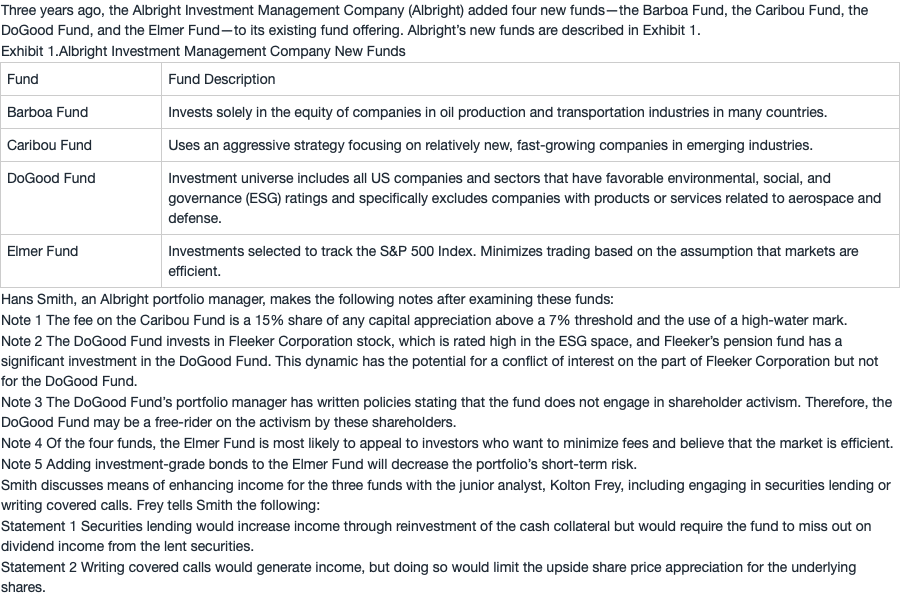NO.PZ201809170400000103
问题如下:
Three years ago, the Albright Investment Management Company (Albright) added four new funds—the Barboa Fund, the Caribou Fund, the DoGood Fund, and the Elmer Fund—to its existing fund offering. Albright’s new funds are described in Exhibit 1.
Exhibit 1.Albright Investment Management Company New Funds

Hans Smith, an Albright portfolio manager, makes the following notes after examining these funds:
Note 1 The fee on the Caribou Fund is a 15% share of any capital appreciation above a 7% threshold and the use of a high-water mark.
Note 2 The DoGood Fund invests in Fleeker Corporation stock, which is rated high in the ESG space, and Fleeker’s pension fund has a significant investment in the DoGood Fund. This dynamic has the potential for a conflict of interest on the part of Fleeker Corporation but not for the DoGood Fund.
Note 3 The DoGood Fund’s portfolio manager has written policies stating that the fund does not engage in shareholder activism. Therefore, the DoGood Fund may be a free-rider on the activism by these shareholders.
Note 4 Of the four funds, the Elmer Fund is most likely to appeal to investors who want to minimize fees and believe that the market is efficient.
Note 5 Adding investment-grade bonds to the Elmer Fund will decrease the portfolio’s short-term risk.
Smith discusses means of enhancing income for the three funds with the junior analyst, Kolton Frey, including engaging in securities lending or writing covered calls. Frey tells Smith the following:
Statement 1 Securities lending would increase income through reinvestment of the cash collateral but would require the fund to miss out on dividend income from the lent securities.
Statement 2 Writing covered calls would generate income, but doing so would limit the upside share price appreciation for the underlying shares.
The DoGood Fund’s approach to the aerospace and defense industry is best described as:
选项:
A.positive screening.
B.negative screening.
C.thematic investing.
解释:
B is correct. The DoGood fund excludes companies based on specified activities (e.g., aerospace and defense), which is a process of negative screening. Negative or exclusionary screening refers to the practice of excluding certain sectors or companies that deviate from accepted standards in areas such as human rights or environmental concerns.
A is incorrect because positive screening attempts to identify companies or sectors that score most favorably regarding ESG-related risks and/or opportunities. The restrictions on investing indicates that a negative screen is established.
C is incorrect because thematic investing focuses on investing in companies within a specific sector or following a specific theme, such as energy efficiency or climate change. The DoGood Fund’s investment universe includes all companies and sectors that have favorable ESG (no specific sectors or screens) but with specific exclusions.
这道题为什么不选A?
提到了rating啊?




